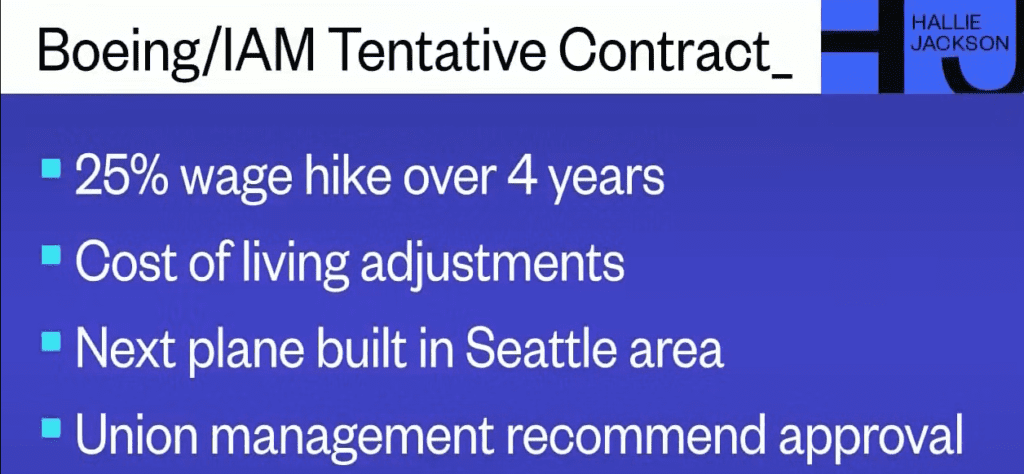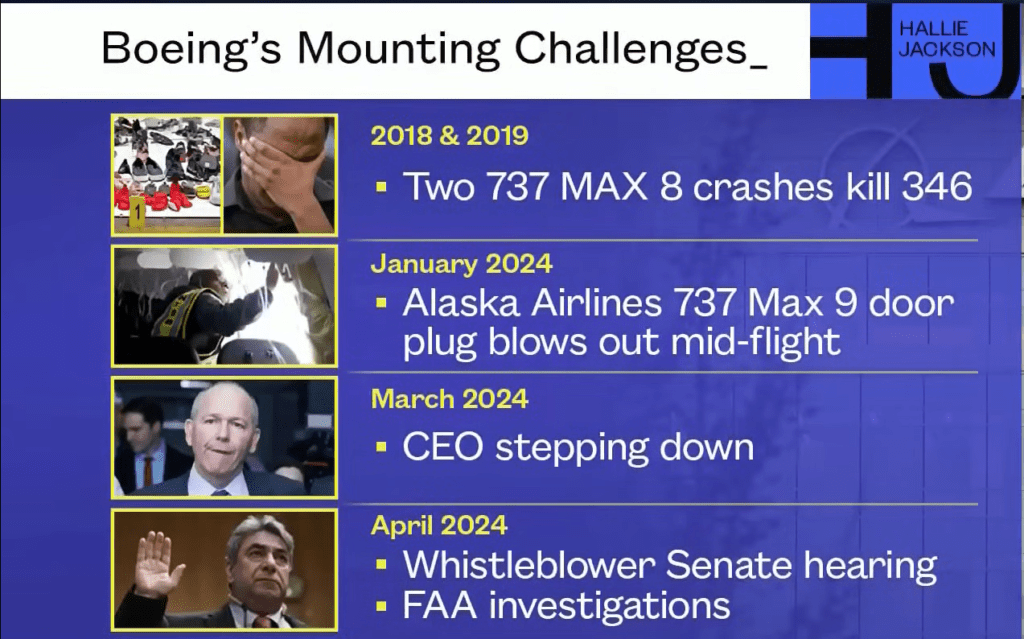Union Vote at Boeing: Will Workers Accept 25% Pay Raise or Strike?

By: Niraj Kumar | My Global Times
Lead Paragraph:
Boeing workers are on the verge of a potential strike as union members vote on a proposed contract that could either avert the crisis or lead to a walkout. With pay raises at the core of the debate, the decision is crucial for both the employees and the newly appointed CEO, who aims to steer the company back on track. The workers argue that despite the proposed 25% wage increase over five years, it’s not enough given inflation and years of perceived underpayment.
The Company Brings in a New CEO to Clean Things Up
Boeing’s decision to bring in a new CEO comes at a critical time. The company has been under fire due to various challenges, including the ongoing negotiations with its workers and operational setbacks. The new CEO has promised to resolve long-standing issues, but his ability to handle the current tension with the workforce remains to be seen. According to industry insiders, his success in resolving these tensions will shape the future of Boeing’s labor relations for years to come.
Potential Strike: What’s at Stake for Boeing?

The potential strike could have significant consequences for Boeing. With a workforce dissatisfied with the current contract proposal, a strike could lead to delays in production, financial losses, and reputational damage. For the aerospace giant, keeping workers happy is crucial, especially as they seek to regain their competitive edge in the industry. The new contract includes a 25% pay raise over five years, a figure Boeing’s leadership sees as fair.
However, for many workers, the 25% increase is not enough. Inflation has eroded their purchasing power, and many are asking for a 40% pay raise instead. In comparison, industries such as automotive and airlines have seen workers win larger wage increases after threatening strikes. Boeing’s employees believe they deserve a similar outcome.
Pay Raises and Discontent: Union Leaders and Workers Speak Out
Pay is the central issue in this negotiation. While Boeing’s leadership and union representatives have reached a tentative agreement, workers on the floor remain skeptical. The previous contract only saw a 1% raise every few years, leaving many feeling shortchanged. One machinist shared their frustration, stating, “The way inflation and times are, people on $20 an hour cannot survive.”
Many workers believe a 25% raise over five years is insufficient to keep up with the rising cost of living. They argue that other industries have secured much larger pay increases. “We’re not just tilting bikes. We’re building airplanes,” one worker emphasized, highlighting the critical nature of their work and the need for better compensation.
What the Vote Could Mean
Workers are now voting on whether to accept the contract or go on strike. To approve the contract, a simple majority of 50% is required. However, for a strike to be called, two-thirds of the workers must vote in favor—a much higher threshold. The outcome remains uncertain, with many workers on the fence. They may reject the contract but still avoid a strike if the majority doesn’t reach the two-thirds requirement.
The decision is expected by the end of the night, and if the strike goes ahead, it will start at midnight. Such a scenario would put additional pressure on Boeing’s new CEO, who is already facing numerous challenges in his new role.
Judge Drops Two Charges in Donald Trump’s Georgia Election Interference Case
Boeing New CEO Faces a Tough Test
Boeing’s new CEO has been vocal about the challenges the company has faced over the past few years. He has made efforts to connect with the workforce, including visiting the factory floor and engaging directly with the union members. While his leadership is still in its early days, he has promised to correct the problems that have plagued the company.
However, the CEO is walking a fine line. While a 25% wage increase is a significant offer, workers remain unsatisfied, drawing comparisons to the pay increases won by other unions. The CEO’s ability to navigate this tricky situation will determine his success in gaining the trust and support of Boeing’s workers.
Longstanding Frustrations in the Workforce

The discontent among Boeing’s workers has been brewing for years. Many machinists have expressed frustration with the company’s decisions over the past decade and a half, including the opening of a new facility in South Carolina. Workers in other locations saw this as a move to weaken the union’s bargaining power.
Covering Boeing for 30 years, one reporter shared, “I see the frustration that has been building up with the machinists over the last 15 years. When Boeing opened up in South Carolina, the members here got upset about that. They have not been happy with many decisions.”
This deep-rooted frustration is now coming to the forefront, and how Boeing handles the current contract negotiations will have a lasting impact on its relationship with its workforce.
Conclusion: The Way Forward for Boeing and Its Workers
As Boeing’s workers vote on the new contract, the outcome will have significant implications for both the company and its employees. The 25% pay raise over five years is a generous offer by some standards, but many workers feel it does not go far enough, especially in the current economic climate. With inflation rising and the cost of living increasing, many workers are pushing for a 40% raise instead.
For Boeing’s new CEO, this is a critical moment. If he can successfully resolve the tensions between the company and its workforce, he will gain credibility and trust. However, if the workers decide to strike, Boeing could face significant disruptions, further complicating the company’s efforts to recover from past challenges.
The vote will determine whether Boeing’s workers are willing to accept the contract as it stands or if they will walk off the job to demand more.





